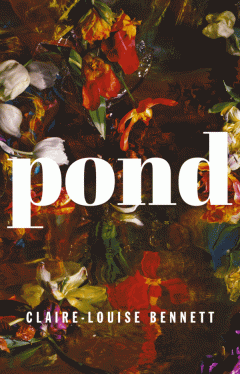Let me be honest with you: I struggled to get through Pond. Not because it wasn’t brilliant. It was totally brilliant. In this book, Claire Louise  Bennett does what the best writers do with language: reinvent it. She slams together such strange pairings of words together that, while reading, I felt my brain sweat and pant to keep up. It is a thrilling, dark little gem of a book. And yet I struggled to get through it.
Bennett does what the best writers do with language: reinvent it. She slams together such strange pairings of words together that, while reading, I felt my brain sweat and pant to keep up. It is a thrilling, dark little gem of a book. And yet I struggled to get through it.
Maybe that’s because the book is so deeply rooted in voice, not in plot. The entire success of the novel is predicated on her narrator being entertaining enough to entertain us through perspective, not moment. And it works! In strange, detailed, exacting language, the narrator constructs her world and her body through words. The narrator’s rural Irish cottage becomes enchanted through her unique perspective. It’s utterly unlike anything I’ve ever read before. It’s utterly genius.
“English, strictly speaking, is not my first language by the way. I haven’t yet discovered what my first language is so for the time being I use English words in order to say things. I expect I will always have to do it that way; regrettably I don’t think my first language can be written down at all. I’m not sure it can be made external you see. I think it has to stay where it is; simmering in the elastic gloom betwixt my flickering organs.”
But though it’s a thrill, it isn’t a pleasure. And that’s probably my own close-minded fault. It isn’t a pleasure to read because, well, the narrator is — gasp! — unlikable. Sometimes I thought to myself, oh god, if I have to spend another moment in your cold witty grasp I’ll just have to binge an hour of the Kardashians to recover.
Yet the narrator’s “likability” doesn’t get in the way of my judgment of the book. Because guess what? That shouldn’t matter in determining the merits of a book. In fact, I recommend you all to go pick up Pond and read it. Because the narrator isn’t likable, but she’s herself. She’s just a person whose rich, twisted inner life is made penetrable by the page.
“I only wish you could spend just five minutes beneath my skin and feel what it’s like. Feel the savage swarming magic I feel.”
There’s such a glaring double standard when it comes to unlikable characters in literature. We delight in Raskolnikov and Holden Caulfield. We gladly skip along journeys with the most curmudgeonly, horrendous men we’d never want to be friends with in real life. And hey, that’s because books aren’t real life. They’re windows into lives that aren’t hours. What a joy to read, if ever briefly, the story of someone who’s brave enough to be unlikable.
Take this quote by Claire Messud, which sums this up quite succinctly: “Would you want to be friends with Humbert Humbert? Would you want to be friends with Mickey Sabbath? Saleem Sinai? Hamlet? Krapp? Oedipus? Oscar Wao? Antigone? Raskolnikov? Any of the characters in The Corrections? Any of the characters in Infinite Jest? Any of the characters in anything Pynchon has ever written? Or Martin Amis? Or Orhan Pamuk? Or Alice Munro, for that matter? If you’re reading to find friends, you’re in deep trouble. We read to find life, in all its possibilities. The relevant question isn’t ‘Is this a potential friend for me?’ but ‘Is this character alive?”
So even if I cringed while reading this novel, cringed at a narrator so unabashedly (and occasionally disturbingly) herself, I celebrate her right to exist. I celebrate the idea that a character doesn’t have to be “likable” to land on the page. Put simply: if books were entirely composed of likable characters we would have a lot of boring books.